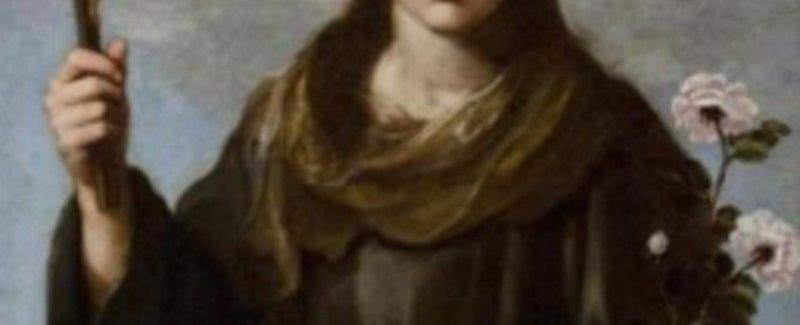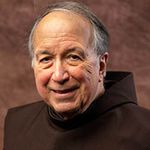Saint Rose of Viterbo: Audacious Secular Franciscan

On September 4, the Franciscan family celebrates the memory of Saint Rose of Viterbo (c. 1233-1251), an audacious young Secular Franciscan woman who challenged her contemporaries as a public preacher.
Captivated by Franciscan friars
Born in the city of Viterbo, about 50 miles from Rome, to a working-class family, Rose was captivated by the Franciscan friars who had established a church there. She began dressing in their habit and devoted herself to prayer and ascetical practices in her home.
Gained reputation of foretelling future
She also experienced visions and gained a reputation of being able to foretell the future. To the consternation of her parents, people flocked to their home to hear Rose speak. In time, they allowed her to join the Brothers and Sisters of Penance (the Franciscan “Third Order”).

This window in La Crosse, Wisconsin, depicts Saint Rose.
Preached publicly to urge people to turn their lives to God
Although still in early adolescence, Rose began preaching publicly, girded in a Franciscan cord, leading her followers through the streets, urging people to do penance and turn their lives to God. At the time, the leaders of Viterbo were loyal to the Emperor Frederick II when he was locked in conflict with Pope Innocent IV. Rose preached peace, reconciliation, and loyalty to the Church, and so she and her family were exiled from the city; as the political tide turned after the emperor's death (which Rose had predicted), they were allowed to return.
Sought but was denied admission to Poor Clare monastery
In her late teens, Rose sought admission to the local Poor Clare monastery, but the nuns refused to accept her because of her controversial reputation and the fact that her family could not provide a dowry. She continued her life of penance in her family home, where she died on March 6, 1251.

Church of Santa Rosa in Viterbo. The monastery of Poor Clare is in the shadows to the right.
Body remains object of great veneration
Her body remains an object of great veneration in Viterbo today. Recent examination of her remains indicate that she died of a rare enlarged heart condition known as Cantrell’s Syndrome.
Acclaimed a saint by popular devotion
Rose was quickly acclaimed a saint by the people of Viterbo who carried her body to rest in a local church, and Pope Innocent IV began a process for her canonization. In 1257, Pope Alexander IV ordered that her incorrupt body be enshrined in the Poor Clare monastery that had refused her entry in life! For various reasons, however, her cause did not go forward, and Rose was not canonized until 1457. By that time, her role as a lay mendicant preacher had been removed from the official biographies.

The body of Saint Rose is enshrined for veneration in the Church of St. Rose in Viterbo.
Feast day remains major civic celebration in Viterbo
The people of Viterbo remain devoted to Rose's memory. Her feast day is the major civic celebration in the city, and a huge 30-meter pillar bearing her statue, called the macchina of Santa Rosa, is carried in procession on the vigil of her feast day through the city center to the church where she lies. You can get a glimpse of this combination of popular piety and civic pride below. This year, as last, the procession unfortunately is not being held due to COVID-19 concerns. https://www.youtube.com/embed/_iziKFQ5QVA

The brotherhood of 100 facchini carry the 5-ton macchina of Santa Rosa in procession on the vigil of her feast in Viterbo.
Learn more about Saint Rose of Viterbo
Dominic Monti, OFM
Professor of Franciscan Research in the Franciscan Institute of St. Bonaventure University
Dominic V. Monti, OFM, is a Franciscan Friar of Holy Name Province (USA) and currently professor of Franciscan Research in the Franciscan Institute of St. Bonaventure University. He devoted the greater part of his ministry to teaching the History of Christianity, in particular the history of the Franciscan movement. He has contributed two volumes to the Works of St. Bonaventure series and is author of Francis & His Brothers, a popular history of the Friars Minor.

